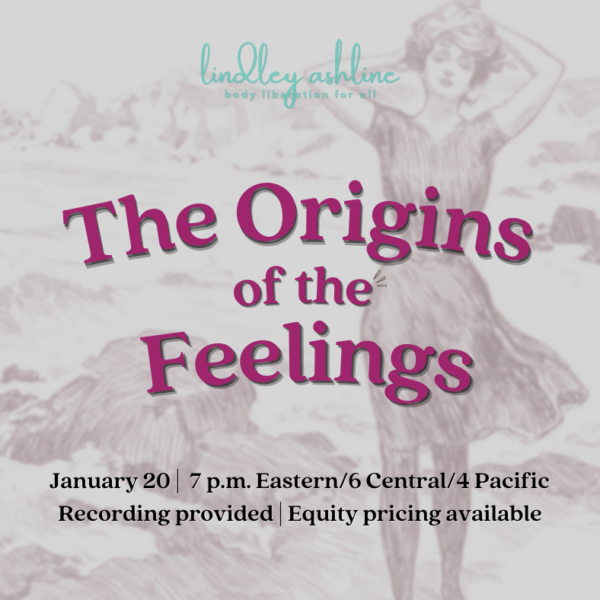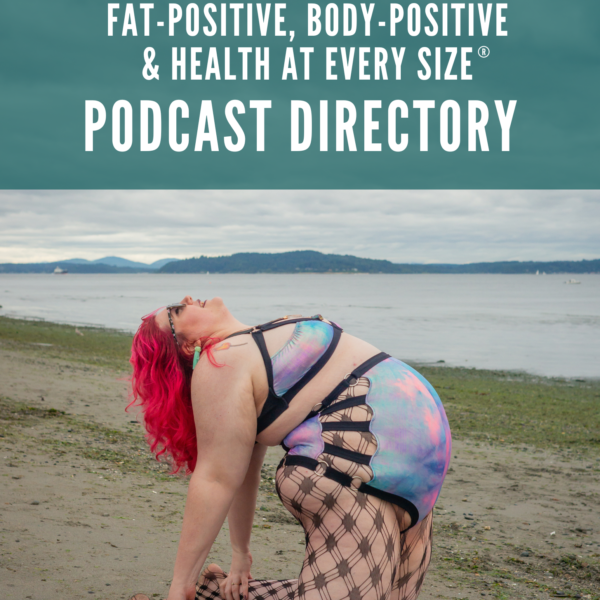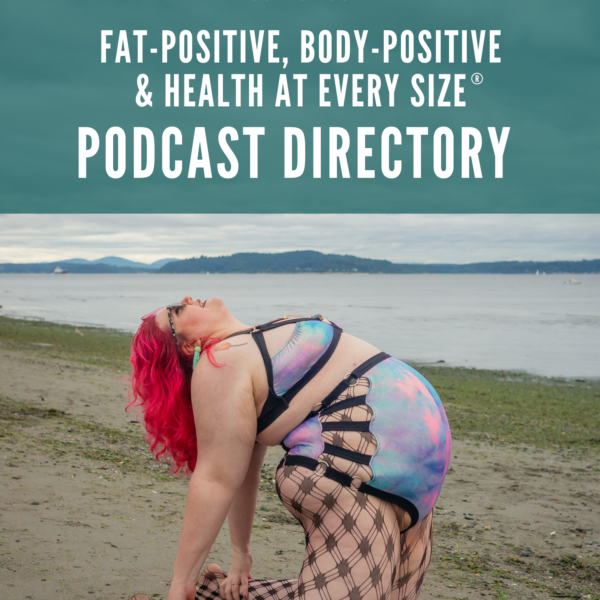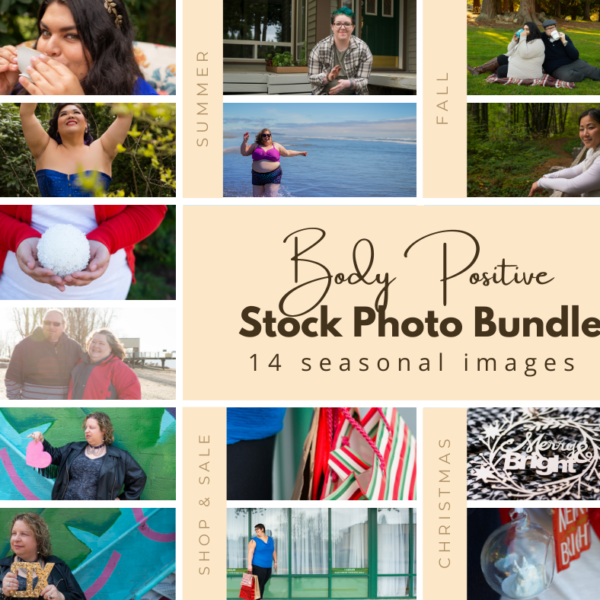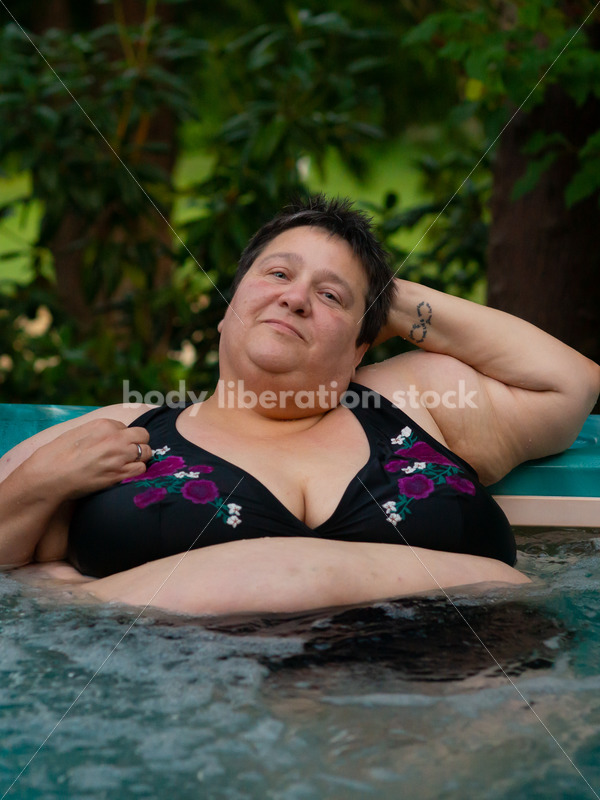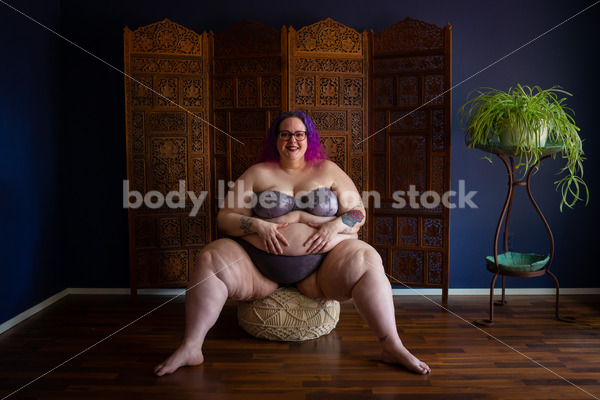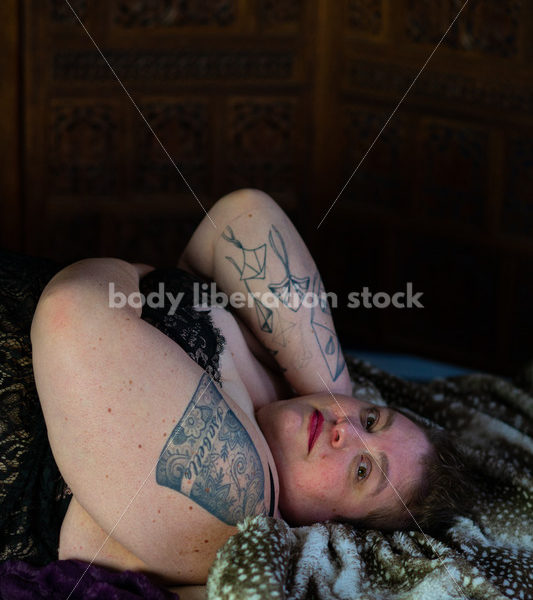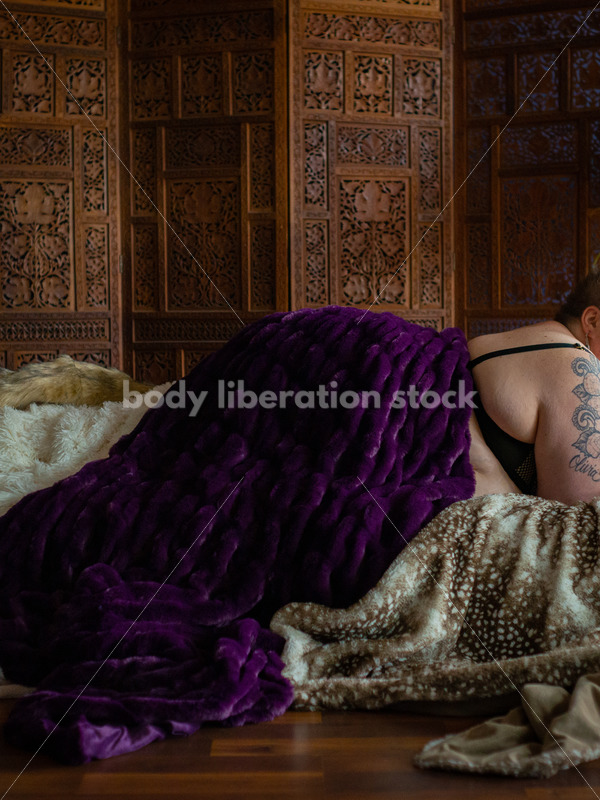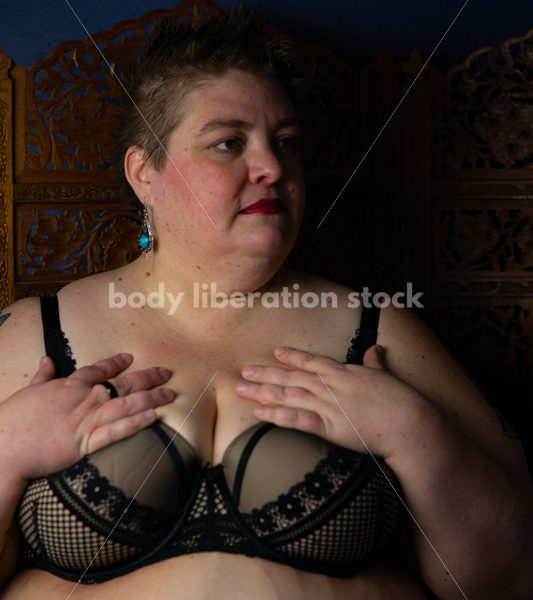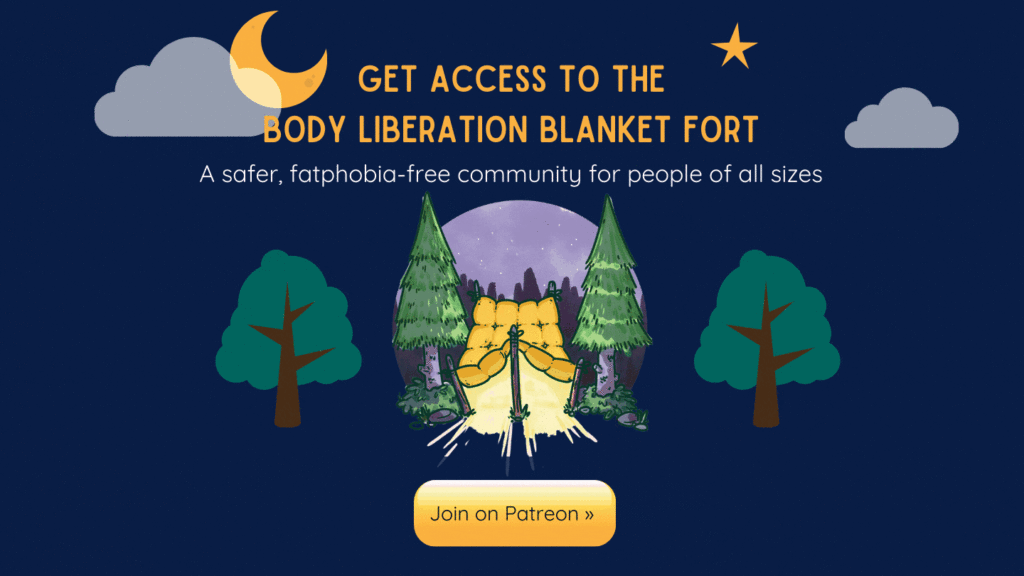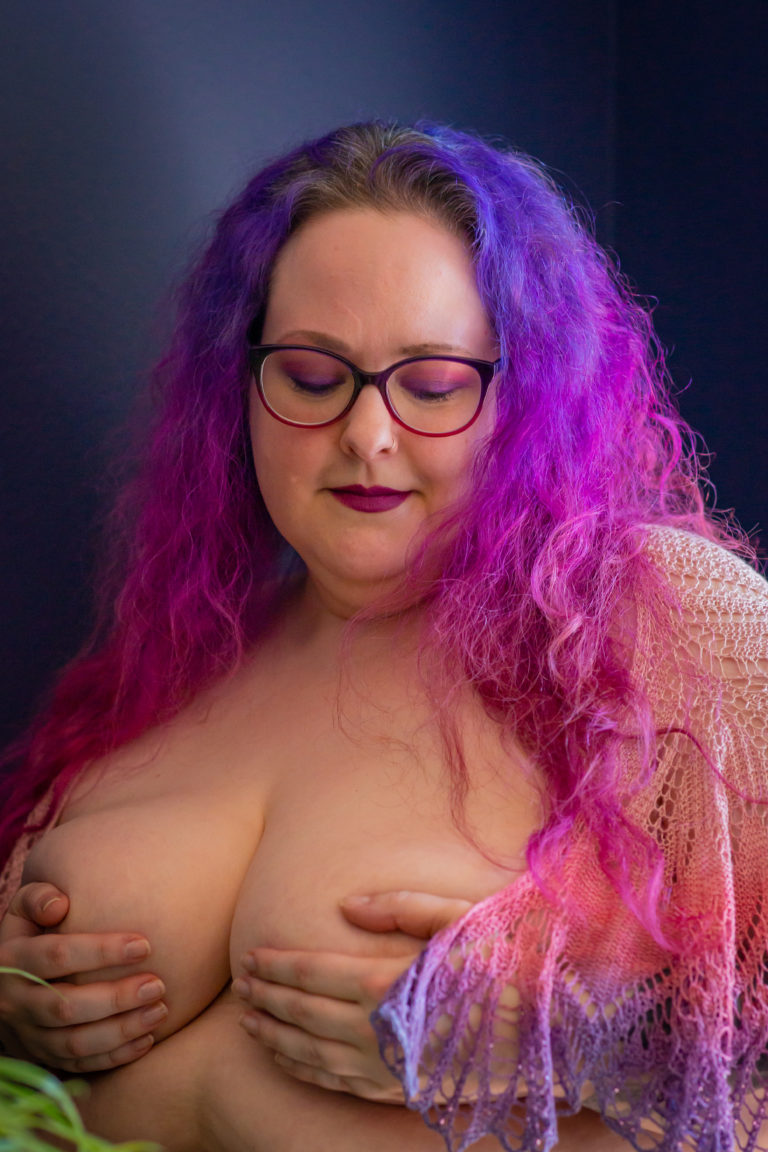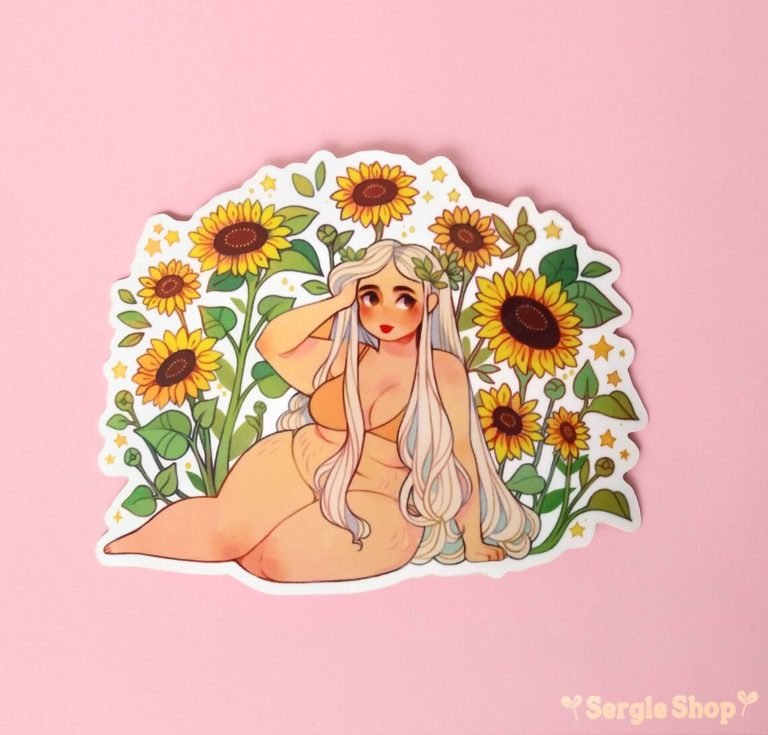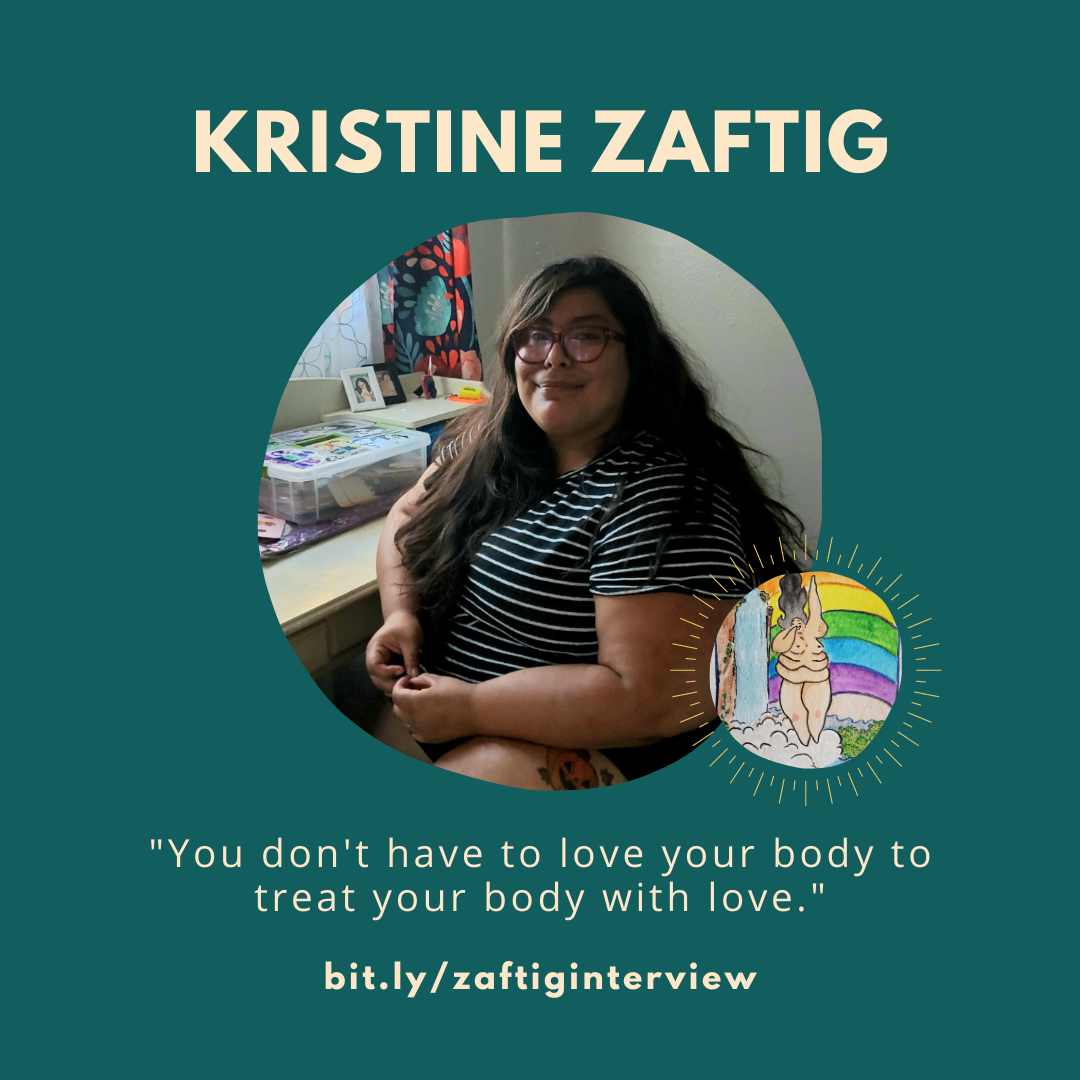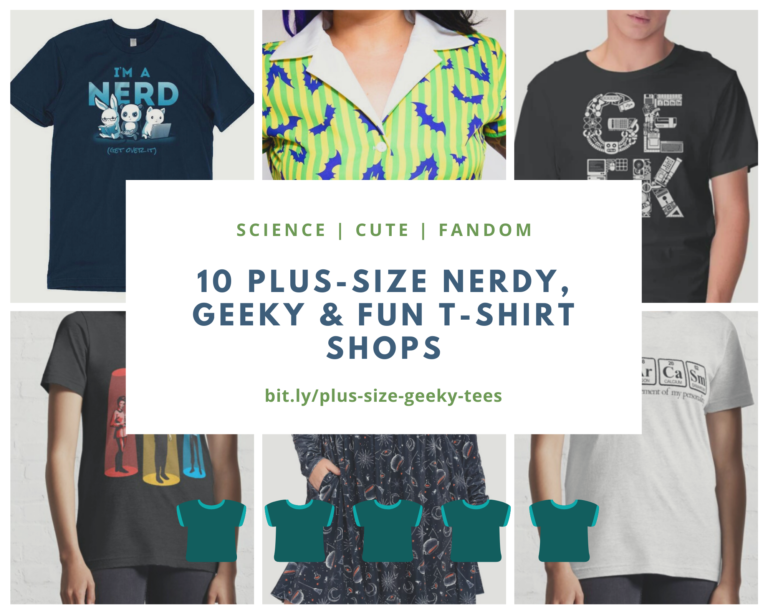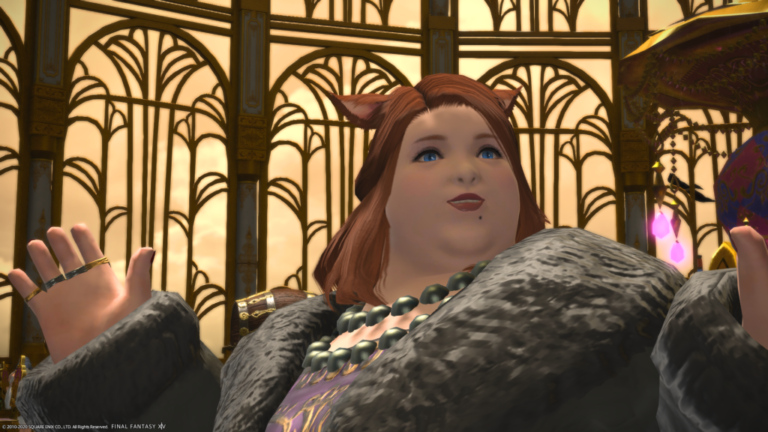LISTEN: Lindley on the Fat Face Feelings Podcast (with Transcript)
It’s always a delight to talk with one of the Fat Faces, Eron, and this time we did it on the record! (Amanda is also a delight, but was absent that day, alas.) We dig deep into my entrepreneurial journey, why I chose to work with fat folks, and your official permission to take care of yourself (and unfriend that diet-talking college roommate).
Find more episodes at www.fatfacefeelings.com.
Listen
Transcript
♪ [music] ♪
Amanda: I’m Amanda.
Eron: And I’m Eron.
Amanda: We’ve got fat faces.
Eron: And we’ve got some feelings.
♪ [music] ♪
Eron: Hello, my lovely fat face.
Amanda: Hello, my other lovely fat face.
Eron: Welcome to episode #10.
Amanda: Episode #10, double digits.
Eron: We’re growing up so fast.
Amanda: We are!
Eron: …our little baby podcast.
Amanda: We’re almost a pre-teen.
Eron: Oh, my goodness. What’s going to happen? Things are about to get dicey.
Amanda: My voice currently sounds like a pre-teen.
Eron: Yes, you hit puberty early.
Amanda: …or late, I don’t know.
Eron: Wait a second, yeah.
Amanda: I mean, I’m 32, so maybe I should’ve gone through this before. But that’s what it is, I’m regressing because of the podcast.
Eron: Oh, no!
Amanda: So I’m aging. It’s like a weird Benjamin Button thing.
Eron: Oh, my goodness!
Amanda: But it’s only happening to my voice.
Eron: Benjamin Button Voice Podcast Thing Syndrome.
New in the Body Love Shop
Amanda: Yeah! So, in the episode that everybody is about to listen to. You will notice that I am absent. Eron graciously interviewed all without me which I’m so, so thankful. I mean, I wasn’t stressed about it. But I’m just so thankful that she was up for it. And Lindley, thankfully, who I guess we should introduce…
Eron: Yeah!
Amanda: …Lindley Ashline who you’re interviewing. Thankfully, we’ve gotten to know her pretty well. And she’s just great and super kind that I was really disappointed to miss out on the interview. But I had no voice!
Eron: You had no voice! And so, I doubled my voice. And she welcomed me in as she always does. She has an amazing home down south. It’s so kind and hospitable.
It was really fun. We did miss you, Amanda. But I’m excited to share this interview with everyone. And yeah, there’s not a whole lot to say. Lindley says it all. And I’m really excited for all the listeners who haven’t met Lindley to have a chance to hear from her and all the things she does.
So, with that…
Amanda: [drum roll]…
Eron: [drum roll]…
Drum roll…
Enjoy!
♪ [music] ♪
Eron: Hello! It’s me, Eron. Half of the Fat Faces. And I am here in Renton… correct? Are we technically in Renton?
Lindley: Yes.
Eron: Okay! Normally, we’re up north of Seattle. But today, I got to take a really fun field trip. And I am at our friend, Lindley Ashline’s house. We are in her cool office where she does so many fun different things that she’s going to tell us about today.
So, Lindley, thank you so much for having me here today.
Lindley: Thank you for inviting me.
Eron: Thanks for letting us at your house. We love going to your house.
Speaking of… I think Amanda and I have told this story before on the podcast. But one of the things that really pushed us towards doing this podcast and us getting more involved in the community was I kind of tricked her into coming to a clothing swap here at Lindley’s house. And it was my first body positive, plus size clothing swap that I’ve ever been to. And I found it through Facebook because Lindley is great at marketing that stuff on Facebook. I emailed Lindley and said, “Hey, I know I’ve never met you. But can I come over?”
And she was so kind and welcomed Amanda and I. We had this magical experience and decided, “Oh, my gosh! These are our people. This is the community that we want to be with.”
So, we’re really excited to introduce Lindley to our listeners.
And a lot of you may know Lindley already just because of the great community that we have around here.
So Lindley, will you tell us about yourself a little bit?
Lindley: Sure! I’m Lindley. And I’m a professional photographer here outside Seattle. I do use she, her pronouns. And I’m a pretty girly-girl. I live here with my husband and two incredibly spoiled cats (one of whom is giving us a little bit of a stink eye as we record because we’re not petting her. So she’s not the center of attention which is not her favorite thing).
I do run a portrait and boudoir photography studio here in Renton at my home. And I also sell diverse stock images through RepresentationMatters.me which I’m sure we’ll talk about here in a little bit.
Eron: So, Lindley is an incredible—I think I’ve said this before, but like a badass boss babe with the businesses that she’s running. And not only is she successfully running these photography businesses in this top photography site. But she’s doing it with an amazing mission in mind, which we love that kind of thing.
So, we’re just going to ask a couple of questions. First, how did you start hosting these body positive events, like the clothing swap?
Lindley: Well, I’ve been here in the Pacific Northwest for about four years now—actually, four years next month. And I really love it here.
But previously, I lived in Virginia. We both worked in Washington DC and commuted from Virginia. And at the time—this was, oh gosh, about 10 years ago, 2007 or 2008—I discovered the old fashionista Live Journal community because this is when Live Journal was still a big thing. And someone there was talking about doing a plus size clothing swap.
And I was just starting to discover body acceptance and fat acceptance and starting to learn to look at my own body. And I had just started doing some outfit of the day photos.
I wouldn’t consider myself a fashionista of any kind. I tend to go with what’s comfortable. Particularly since moving here to Seattle, my uniform tends to be jeans and a plaid shirt because everybody here is super casual. And also now, since I’m working for myself, I wear a lot of pajamas. But at the time, I was working in offices too. So I needed a bigger variety of clothing.
And even 10 years ago, plus size clothing was much, much harder to find, especially anything stylish.
But also, I wanted more community around fat folks, to be honest. It didn’t feel like—I hardly had any community of that sort at all. And I was just discovering it. It seemed like, “Well, maybe one way that I can create a little bit of community here, and also find some cool, new clothing, is to host a specifically plus size clothing swap.”
Ten years ago, that was a bigger deal than it is now.
And so, I put out the word, I guess, probably through Live Journal. I don’t even remember now. Facebook, I don’t even know if Facebook existed in 2008. And if so, it was very new. I don’t know, maybe it was on MySpace. I have no idea.
At any rate, the very first one I threw, zero people attended.
Eron: Awww…
Lindley: And the second time, three people came, and then five, and then 10. And the parking around my neighborhood was maxed out at about 15. We kind of overwhelmed the neighborhood at that point.
And it didn’t need to be big to have that spirit and that sense of community. It was supposed to be like a 2- or 3-hour event. I would set it for like 3 to 6 p.m. And we would end up staying for the whole evening! We’d order pizza in. And we would just talk.
And just for a lot of the folks who came—and that’s still true. Eron and Amanda are such a great example here. For the people who come, a lot of the time, it’s the first time that they’ve ever had community that’s not negative about their own bodies. It’s the first time that they’ve been on an event where we don’t talk negatively about our bodies. We don’t all pick at the donuts on the table and talk about how terrible we are for having a donut, and so we’re only going to have half a donut.
We don’t do that. We don’t do that at my events. We don’t do that stuff. Why interfere with a really amazing experience by being negative.
So, when I moved here, of course, I wanted to continued doing that, creating that community and giving that experience. And of course now it’s mostly on Facebook that I’m talking about these things and advertising them.
And the first one I had here, zero people showed up. And 30 people RSVP’s on Facebook. And so I had prepared for 30 people and was like digging out folding chairs and everything!
Eron: Wow!
New at Body Liberation Stock
Lindley: Like the whole nine yards. I had all these food. And so, I learned, now I make people RSVP by email. And you might consider that if you’re considering setting up your own clothing swaps because Facebook events are really a poor way to be able to tell how many people are going to be able to physically come in person.
So then, just like when I had done them in Virginia, the first one was zero; then it was three, and then five. And I think now we’re getting 15 or 16 people.
And it’s funny because when we bought our house here in Renton, one of my criteria was that it had to have enough parking to hold this kind of event. That was actually one of the criteria for the house, was that it had to be reasonably accessible, like not five flights of stairs if we could help it.
And my home, unfortunately, isn’t wheelchair accessible. It does have like a half flight of steps to get into the house. But it was the closest we could find that also have lots of street parking and a nice, big living room.
And so, those were some of my criteria because it’s really that important to me.
And so, I’ve bee doing a clothing swap here for over three years now since we moved into this house. And then, I started adding other events, like a book club. And every once in a while, we do something I call a fat tea because it looks like fatty and it makes me really happy. It’s sort of like a happy hour with tea or a little tea party. It’s super informal. It’s just like a hangout. But it’s slowly expanding into these other events.
Eron: Yeah. And I got to come to the book club for the first time this past month because I finally decided to read a book.
Lindley: I will say that it has been…
Eron: No, I read sometimes.
Lindley: I will say that it has been a little bit challenging since I started the book club to read a full book every month. And sometimes, yeah, we show up and we’re vulnerable and we say, “I had a long month. I only read three-quarters of it” or whatever. And that’s okay too.
Eron: I appreciated it though that even having not—I only read about half of the book by the time I got to the book club meeting. But I appreciate that no one was like shaming and all that. They’re like, “Yup! Been there, done that. You can still talk about it.” And we did! We had a really good time. It was a really nice intimate group and I appreciated meeting new people once again.
I feel like you’ve always been like my social director for the past six months. I think a lot of new people that I’ve met—and Amanda as well. I think she might say the same thing—has been through you and amazing events with you.
So yeah! Well, this kind of brings me to this next question which makes me very curious. It seems like you’ve done a really good job of being intentional about the space that you create and the hospitality that you offer people as a fellow southerner.
Lindley: Yes, absolutely.
Eron: And so then how did photography become your main occupation?
Lindley: Well, it really ties back into that, that sense of being intentional. And yes, as a native southerner, hospitality is something that I was trained in very firmly. And if my mother listens to this, thank you, mom. It’s very much “Okay, is there parking for everybody? How are they going to feel when they walk in the door? What kind of environment do we want to have here? Can I get you some water or tea?” I always have sweet tea around because I’m a southerner.
But coming back to that sense of intention, I started as a nature photographer like many, many, many portrait photographers do. And I still do. I was out yesterday at a Japanese garden happily snapping away. I still do a lot of nature and landscape photography. But I started that about 15 years ago. And so, I was sort of slowly working on my photography skills all that time.
And I had a succession of increasingly terrible office jobs in my corporate career where I just was increasingly unhappy with the positions I was in and the working style.
I don’t think I’ve talked about this publicly before, but I’m just a tiny bit on the autism spectrum and the Asperger’s range. I have a very hard time working in open environments. And since over the course of my corporate career, we went from offices to cubicles to these open spaces, I had a really hard time with all that background noise to be able to concentrate. And it makes me really unhappy.
Anyhow, I was working at a job that was actual full-time remote, but it was very dysfunction. And like I said, I was increasingly unhappy. And I think, for entrepreneurs, this is a pretty common story where we were doing well in our corporate career as a career, but we’re increasingly unhappy in it.
And I had a friend at the time who was a life coach. I signed up for some sessions with her and just went “I can’t! I’m done, I’m done. What am I going to do now?”
I had said for many years that I wasn’t going to try to monetize my photography because it made me to happy. I had run a couple of other small businesses before that hadn’t done very well. And the thought of tying something I love so much to something that felt like it might fail, I didn’t want that kind of pressure. I didn’t want to ruin photography.
And my friend who was coaching me said, “Well, clearly, you’re very passionate about this. How can you do photography for a living in a way that also makes you happy?”
And so she helped me set that intention from the very beginning because I thought about doing—
There are lots of ways you can make a living in photography if you’re good enough and lucky enough and try hard enough. There are lots of things. You can be a wedding photographer. You can be a food photographer. There are so many options.
And so, I thought about doing sort of mainstream photography. And it filled me with the same sense of dread than something like an open office did. And so I had to take a while, a few days, and think about, “How can I do this in a way that is intentional for me and coherent?” […] “How can I make this coherent?”
And I immediately came back to the body acceptance community, to fat acceptance, body positivity. The word has changed over time. But those are my people. Like Eron was saying a few minutes ago, “These are my folks. How can I use photography to serve them?” And that was where it all started coming together.
And so, I started studying portraiture and boudoir photography from the standpoint of not only learning the technical photography skills, learning studio lighting, and learning posing. But only doing it from a perspective that honored all kinds of bodies because photography culture is very thin body-centric and very heteronormative and very—don’t get me started. I can talk all day about some of the challenges that we have with photography culture perpetuating beauty norms. And I think we’re going to talk about that a little bit here in a few minutes too.
But really turning those things on their heads, say in when I started working with models to practice my own skills before I got clients, I deliberately only worked with plus sized folks.
And when you’re looking for models, it tends to be your friends and family and whoever you can drag in front of the camera so that they can stand there for half an hour while you figure out how to do lighting or posing. And so it’s probably pretty boring from their end.
But I went on Craigslist and I said, “I’m specifically looking for plus size folks to come stand in front of my camera.”
New at Body Liberation Stock
And I had to build up cred with that too. As soon as I had a couple of folks, I set up a little website. It was really crappy. But it was just to show that I’ve worked with other plus size folks and they can trust me to be respectful. And at that point, people started coming out of the woodwork, people that I met at clothing swaps, people who their friend had model. And now I have this huge, wonderful list of people who want to model for me who were from all walks of life and all body sizes and skin colors and all these different folks, most of whom are not people that you would see in magazines or advertisements.
And that had really become my intention and my focus and my purpose, is to give those folks a chance to be in front of the camera too and to honor their bodies and not just thin, white folks.
Eron: Yeah, that’s amazing. I love that. That was such an inspiring story of how you got there and how you set your intentionality from the very beginning. I mean I think that is such an important part of that story of you—not only was it a goal that you had or this idea of like “Oh, I want to get out of the cubicle and the corporate world thing.” It was “I want to go to this. I want to reach this.” It’s really great.
Something that you talked about a couple of times was the thin ideal. There are other ways to phrase that right. But we talk a lot about how not everybody that listens to this necessarily knows that vocabulary. So can you talk about what that means to you or what that means basically.
Lindley: Yeah, absolutely. A funny side story…
The first clothing swap that you and Amanda came to, I tend to assume that anyone who’s in my orbit was familiar with body acceptance terms and phrases and concepts. And so, at some point, I penned them down and was talking at them about some kind of fat acceptance things. And I don’t remember if it was Eron or Amanda. But one of them had to stop and say, “You know, you’re great. But I had no idea what you’re talking about.”
So, I do tend to jump right in with folks and kind of get them to the 301 level.
So, come back to the 101 very briefly, I’m actually going to quote from Wikipedia because I really like their definition of the thin ideal.
Eron: Cool!
Lindley: It says: “The thin ideal is the concept of the ideally slim female body. The common perception of this ideal is that of a slender, feminine physique with a small waist and little body fat.”
And that’s basically what we see in the media all the time. We’re slowly, slowly inching outside of that. We do see folks who have brown skin in the media and folks who are in the LGBT community and with larger bodies. But it’s rare. A lot of them in 2018 (when this is being recorded), there’s still tokenism where we have the one size 10 model or the one size 12 model so that we can say, “Oh, we represent all bodies.” And you can probably tell from my tone of voice how I feel about that. And 98% of my work is a direct pushback against that sort of thing.
But seeing only one type of body—
And you know, I want to stop for a second and say that all bodies are valid and all bodies are worthy. But at the same time, it is absolutely not shaming thin bodies to point out that that’s all we see.
And when we only see one type of body, it skews our idea of what’s normal and what’s acceptable. And we know from scientific research that this is true. It’s easy to say, “Well, I don’t let that kind of thing affect me,” but we know that statistically, it does. And this is where our shame about our own bodies comes from because even if your body matches up pretty well to that thin ideal that we were talking about, it never matches up well enough because a lot of what we see in the media is photoshopped too.
And these days, it’s not real. What we’re seeing is impossible for human bodies to look like that.
And so, even if your body naturally matches what we might think as that thin ideal, it’s probably still not going to match what you see in the media.
And so, we know from the study that around 80% of US women and 34% of men are dissatisfied with their bodies. And we also know that at least part of that is due to what we’ve taken visually. I heard that called Your Visual Diet the other day I think from Substantia Jones of Adipositivity which is an absolutely wonderful project. I encourage you to support it. We’ll put information about that in the show notes so that you have a link.
But she was talking about being a visual diet. And I’ve really grabbed on to that term because it’s just wonderful because it sort of describes all the things that you’ve taken around you every day.
Eron: Yeah! Wow. There’s something about that too I kind of wanted to pull out. If you’ve listened before, I like to go on an soapbox every once in a while.
So, this idea that “Well, that doesn’t affect me. I don’t care about what people look like.” In the same way that, sometimes, people will say, “Well, I’m color blind, so race doesn’t mean anything to me.” The fact is if you are socialized in society, you are affected by these things. Unless you’ve been off-the-grid for your entire life in a tree house in Apalache or somewhere, I don’t know, you are part of society, and you have some sort of visual diet as Lindley was talking about.
So, I think a lot of, like you said, what I hear is pushback against “Well, you know, I don’t care. It’s about your personality.” Well, yeah, it is about my personality. But you need to recognize the places that you may have some implicit bias.
So, off the soapbox for a second.
So, what do you think is the best way to start recognizing the harmful visual diet pieces and changing our visual diet? What would that look like to you?
Lindley: Well, there’s two aspects to this. And I’m going to soapbox for a second myself. I can actually talk for just a second about the work I do for Representation Matters. And that is dot-me, not dot-com. At the time that I created the site, the dot-com was taken. And so it’s dot-me.
But the work that I do there is I create stock photos. And for anyone who’s not familiar with what a stock photo is, those are all these images that you see in advertisements and a lot of images in the media and on social media, business social media accounts.
Companies, unless you’re a huge company like Microsoft—here in Seattle, we’re always talking about Microsoft. But unless you’re a Microsoft or the GAP or a huge company, you’re not doing your own photo shoots. It’s too expensive.
And so there are sites called stock photo sites or stock image sites where people can go buy generic photos to put in their social media and their marketing and their magazine ads and so on. And just like with everything else, most of the photos that are available and the images—it’s not just photos. But as a photographer, I tend to be photo-centric. It can also be drawings and diagrams and vector images, all these different things, icons. They also reflect what we see in larger culture. And so they also tend to be very thin-centric, and they are very photoshopped.
Coming back to that body ideal, the ideal image, these are the things that illustrate that. Our visual diet, a huge part of it is made up of stock images because they are these central sites like Getty and iStockPhoto where businesses go and buy these.
And the reason this is relevant to our visual diet is not only that makes up a huge part of our visual diet, way more than I think most people are aware of, but if you’re a business owner, you can help change other people’s visual diets by changing what you’re putting out there.
My audience for Representation Matters, the people who come and buy my photos—which are, again, a direct pushback on that thin ideal—my photos, they’re of large bodies and very large bodies. People who identify as super fat, people that we don’t ever see in the media except as like headless bodies scare stories.
You can’t see me because this is audio, but I’m waving my arms around sarcastically. We don’t ever see [unclear 27:27] bodies in the media except as negative things.
I just did a photo session for the site last week where I had two different—one I think identifies as plus size, the other one identifies as fat. They’re out in the field blowing bubbles and playing in a river and meditating. When have you ever seen a photo of a woman meditating who wasn’t thin… and white? It just doesn’t happen.
Eron: When have you ever seen a stock photo of a woman enjoying herself that wasn’t thin and white? I feel like that is even a deeper question. Sorry to interrupt you.
Lindley: No, it’s good. And on this site, I do all kinds of different photos of people just being people. They’re not photoshopped. And mostly, they’re not posed. I might say, “Oh, okay. I want you to go sit right here and meditate in three inches of water in this river,” which is what we did last week. And the river was freezing. So I’m very grateful to those two particular woman who volunteered to do that.
New at Body Liberation Stock
But they’re not posed in the sense that a lot of things are posed. It’s just normal people. And I’m not photoshopping all their fat rolls. The more you learn about Photoshop and photography, the more you start to realize how fake everything you’re seeing. And so these are very real.
But coming back to business owners, the role that you’re playing in other people’s visual diet is really important because everything you put out there sends a message. And so if you own a business, and all the images you’re putting out are of thin women smiling while eating a salad…
I was going to say a minute ago that I work with a lot of nutritionists and dietitians and eating disorder recovery clinicians of various kinds through Representation Matters. I hear from them a lot about what they need. And also, they’re one of my primary audiences for my specific photography. I also have contributors to the site who have different styles of photos and different illustration types and so on. I’m constantly hearing from those folks.
We talk about food all day. And the only photos we can find of people interacting with food are thin women smiling while eating a salad. And so, if you’re a nutritionist, just to pick on them for a second as an example, if you’re a nutritionist, and every image you put out there is of a thin woman smiling while eating a salad, think about how you’re playing into the world’s visual diet with what you’re posting.
And yes, this is actually a thinly veiled advertisement for Representation Matters. Think about where you can find photos that are less thin ideal-perpetuating. Maybe you should come check out my site.
But for everybody else, for people who aren’t running a business or are running a business where you only post photos of products and no people—of course most of the folks listening are probably not necessarily business owners—for everybody else, the way you change your visual diet is to start being aware of it.
I am pulling numbers out of my rear here, please don’t quote me, but I think we’re exposed to like—well, I can say for certain that we’re exposed to hundreds of images per day in magazines and on the sides of buses and on ads and on TV. And the first step is just to be aware of that. Be aware of what you’re exposed to.
I think this is another area where it’s easy for people to beat themselves up or to be like, “But I like that TV show. And yeah, it’s exclusively thin folks in that TV show, but I really like it. Do I have to give it up?” And the answer is no. No, you don’t have to give up the stuff you love. You don’t have to cut yourself off from TV or never read a magazine ever again.
The goal is just to be aware of what is coming in as part of your visual diet. And see how it makes you feel. After you’ve watched an hour of TV, do you feel inadequate? Do you feel like your body isn’t good enough? Or maybe after you read a magazine, just stop and think about it. Or after you’ve been on Facebook for an hour or Instagram.
Instagram can be a really powerful tool for negative or positive because it’s a very concentrated source of images, and it’s a very concentrated source of idealized images. And so, Instagram is always a really good way or place to start your visual diet analysis and say, “Okay, I’ve been on Instagram. How do I feel? Did it make me feel inadequate? Did it make me feel like my body is huge? Did it make me feel like I really should go to Aruba, all those travel stuff.”
As you start being aware of how things are making you feel, take the things that are the most negative for you specifically. Again, I’m not going to tell you to never watch TV again. But maybe that specific TV channel tends to make you feel worse, or maybe there’s a specific Facebook page you follow, or maybe there’s a family member on Facebook that you need to mute or a friend who makes you feel bad about yourself.
It’s okay! It’s okay to stay friends with somebody on Facebook, but to unfollow them. You can do that. They will not know that you’re not seeing their posts. It’s okay. It is okay to stop following someone on Instagram. It is okay to unfollow that Facebook page. And it’s okay to not watch that TV show anymore or to go to a way to watch TV that you’re not seeing commercials or whatever you need to do for you.
And I think, gradually. That way, you don’t have to go off the grid and live in the heart of Apalache, you know what I’m talking about, and never see the sun again.
And maybe there’s a co-worker that you need to start setting boundaries with who wants to constantly come and diet talk at you. And if that’s making you feel bad, it’s okay to set a boundary and say, “I’m not going to talk about that anymore” and enforce it.
It’s learning to set boundaries with yourself as well as with other people. And if you have family members that constantly make you feel bad about yourself and your body, it’s okay to say, “We’re not going to talk about that anymore.” And then, enforce it.
You’re not hurting anyone. You’re helping yourself by doing that.
And even if you just unfollow one Instagram account that makes you feel bad, that is going to make a cumulative difference in your life. It will make a big difference over time. And once you don’t have that guilt and shame that that one diety Facebook page is giving you, maybe next week, you can do another one. So, it’s totally okay for that to be gradual.
And the thing too is, like what I’m talking about, you don’t have to take yourself off the grid and never see the sun again. Now, there is such a wealth of positive things for you to go look at that you don’t have to feel like—to take a phrase from diet culture, you don’t have to feel like you’re being deprived. You can replace those negatives, the things that make you feel bad about your body with positive ones.
Jes Baker has a wonderful list of body positive and fat positive artists. Meredith Nobel has one as well. And again, we’ll put those in the show notes so that you can find them. But just those two resources, there’s a couple hundred Instagram and other accounts to follow that show all different kinds of bodies, not just the thin ideal and lots of different ethnic background and things too so that your whole diet isn’t just thin, white folks.
It’s so important to do that because it just makes a difference in how you see yourself over time because I don’t know anybody on the planet who can be okay with themselves when they have a constant barrage of people telling them they’re not good enough.
Eron: Absolutely! Amen… I think that’s absolutely true.
And I can attest to the effect that changing your media diet can have on you, your visual diet. I used to hate going on Instagram to be honest with you. I was following a lot of celebrities or people that I thought were funny because I thought, “Oh, get some good jokes. That will make me happy.” But honestly, that wasn’t enough. So much of what is out there is so, for me, triggering honestly because then those things would make me start spiraling.
And once I realized, I guess all it took was somebody like Lindley to give me that permission to say exactly what you just said, you don’t have to follow them. You don’t even have to unfriend the family member that makes you feel bad. You can just mute them. Thank you, Facebook. Thank you. But I will tell you, it has made such a huge difference just in my daily life the changes that I made on my social media.
There are still some TV shows that I watch that I would say are highly problematic, maybe a certain reality show that’s been on way too long about a family who shouldn’t be famous. But I will tell you, I have noticed in myself how aware I am of what is problematic now.
Before, I would just be like, “Oh, okay. I’m feeling uncomfortable. Why do I feel uncomfortable about them shaming their brother for being fat. Why does this make me uncomfortable?” Now, it’s like, “They’re shaming their brother for being a normal size?”
So now, I think you’re right. Just the awareness is a really good place to start, so you can decide what are you going to accept and what are you not going to let come into your life. I think that is such good advice. Yeah, I love that.
Lindley: And if you need it—if you’re listening to this a month after it’s released or 10 years after it’s released or a hundred years after it’s released—you need that permission right now today, here is Lindley Ashline’s official permission to unfollow, unfriend, mute, block, whatever you need to do because your self-care comes before listening to somebody making you feel bad about yourself.
So there it is on a gold-plated certificate. That is your official permission to take care of yourself first.
Eron: Stamped with the seal and everything. I love it!
Lindley: Oh, yeah… with the little ribbons.
Eron: Yeah! Thank you.
So, Lindley, what does the future look like for you? You have set up this really amazing situation where not only are you able to do work that you love, and hopefully, most of the time, keep it to where you’re still loving doing it—because work is work sometimes, right?—but also, you’ve really committed to what I would say is a very worthy social justice, activist goal in what you’re doing, and you’re really holding on what you believe and being, I would say, so admirably strong and straightforward about it that we don’t see that a lot?
So, what does that look like for you going forward?
Lindley: You know, it’s really cool. I actually have an answer to this question. When I was in my corporate career, you’d be in interviews, and it would always be “Oh, where do you see yourself in five years,” and the answer always was “Here, I guess… working in an office, I guess?” I never really felt like I had an answer for that. And now, I feel like I have two hours worth of answers.
From a personal project standpoint or a business project standpoint, I’m working on a—it’s pretty early days for it. So, I don’t know whether it’s going to be a course or a book or what, but a process for helping other photographers turn their existing businesses into something that’s positive for bodies and healthy for bodies instead of perpetuating some of these unhealthy beauty standards; and also, of course, if you’re getting ready to start a photography business, how to do that in a way that respects all bodies.
I’m actually launching here in the next couple of weeks, as soon as Patreon approves it (and I get most of the material is written), a project called the Body Love Blanket Fort—that is exactly what it sounds like. It is a place where you’ll get to interact with me personally a lot. You’re going to get journal prompts and body positive swag, like actual physical gifts in the mail, letters from me and things like body positive stickers and art work and plushies and all kinds of things.
I got to spend an hour yesterday looking up fat unicorn swag. And it was the most fun I think I’ve had in my entire life. And I now have all these amazing fat unicorn sourced.
Eron: Oh, my gosh.
Lindley: I don’t want to steal my own thunder, but that is going to be really amazing.
And depending on the tier, what level you want to support, it includes Skype calls with me. And it includes actual photography sessions with me at the higher tiers. You can actually come in and have a free session with me, portrait or boudoir. And so that is something I’m obviously really excited about. So keep an eye out for that coming very, very soon.
From the rest of my business’ standpoint, as far as Representation Matters go, I am constantly and working really hard to recruit new artists because it was created not just as a platform for me to sell my stock photos, but also to support other artists, particularly artists in more marginalized communities.
I’m fat. I’m on the edge of super fat. I wear like a size 26 or 28 […] But I’m also white […] I’m in a monogamous, heterosexual marriage. I have a lot of privilege. And so part of why I created Representation Matters was as a platform to give a sales platform literally so that people can buy the art work, but also to give a publicity platform for artists who are in more marginalized communities and have less opportunities to sell their art work and get more publicity. So I’m constantly recruiting artists for that.
If you are any kind of artists, digital artist or you paint or you take photographs, and your work represents people of color, people with large bodies, people in LGBT+ communities, get in touch. I would love to have you. It’s a very supportive process.
So if you’ve never heard of stock images before, but you’re interested, come on in. I do a lot of handholding in a good way, a lot of teaching people, and particularly artists. Photographers are more likely to have heard of stock photos and be a little more familiar with that. But I do a lot of guiding of artists through this process. So don’t be intimidated. Come on in!
And from a personal photography standpoint, my vision for Sweet Amaranth is my portrait and boudoir business that I do physically here outside Seattle, my goal for that is to keep running it until the day that it’s not needed anymore, until every photographer is friendly to all bodies and nobody goes to a wedding photographer and gets turned away because they’re too fat. Yes, that is a thing that happens. And yes, I have all kinds of feels about it, none of which are appropriate for the public, for a public broadcast. There’s a lot of cursing in there.
And the day that any person and anybody, any human body, can go to any photographer and get the kind of services that I offer where I’m honoring any kind of body, that’s the day I’ll quit because my work will be done.
So, that’s really the goal. The goal is to do it so hard and so loud that it changes the world and it’s not needed anymore because everybody will be doing it. The day I have too much competition to survive will be the happiest day of my life… except for maybe the fat unicorn. That was pretty great!
Eron: Close second…
Lindley: That’s right.
Eron: Close second…
Lindley: That’s right.
Eron: That’s really beautiful. I love that, I love that. And thank you for being committed to that, thank you. On behalf of the community, the fat community, on behalf of the world, honestly, I think that’s really beautiful.
So, all these wonderful things you’ve been talking about, how can we find you?
Lindley: You can find me—and again, we’ll put link in the shownotes too, I assume…
Eron: Yes… yes…
Lindley: You can find me at SweetAmaranth.com. That is my portrait and boudoir business here in Seattle. You can find my stock image work at RepresentationMatters.me. That’s also where you should go if you’re an artist who is interested in selling your work through the site.
I am on all the major social media sites as myself and also as both of the businesses. I don’t spend a lot of time on Twitter, fair warning. But I am extremely active on Facebook. Please come say hi to my personal page. I love making new friends.
I do run a Facebook group called Joy, Compassion and Your Body. That is free. You’re welcome to hop on in. We do weekly self-portrait challenges—not daily, you don’t have to take a selfie every day. I mean if you what to, and come share it, we would be happy to cheer you on. We do a lot of more in-depth, vulnerable talking there because it’s a closed space. And so, we do do some more vulnerable talking about body image […] and rejecting diet culture.
It’s a nice, closed and secure space to do that. I moderate pretty tightly. So there’s nobody coming in to troll or anything. So it’s a good place to learn to look at your own body.
And of course, The Body Love Blanket Fort which I don’t actually have a domain for yet. Please keep an eye out for it.
Eron: Yes, I’m going to be keeping all my eyes out for that because that sounds so rad!
Well, okay, so a lot of our listeners aren’t necessarily local. We wish that we could all live together in one, happy, fat unicorn biome, I don’t know…
Lindley: Rainbow skies…
Eron: Yeah! But we’re all spread out. So if someone isn’t lucky enough to live up here in the Pacific Northwest and could make it to come to your house or come meet you to do a photoshoot, what are your tips for finding a photographer who is maybe if they’re not vocally body positive but that’s going to respect your body…?
Lindley: That is a fantastic question! And I think the most important thing is—again, when I talk about giving yourself permission and setting boundaries with yourself about negative influences on your visual diet, it is you are worthy of a photographer who respects the body you have right now. Your body is worthy of being seen as it is right now. And I cannot emphasize that enough.
Yeah, you probably have some acne. You almost certainly have cellulite. And your body is still worthy.
And it is up to you how you want to be seen in photos, but you are absolutely worthy of being portrayed by a professional photographer.
The second thing I want you to know is that, again, photography culture is very normative and very invested in perpetuating a lot of thin ideal-related aspects. So, if you’re looking for a photographer, you’re going to see a lot of thin bodies. And take care of yourself as you’re looking through those.
Remember that what you see is a very concentrated sample. Just like looking at Instagram, it can be very intense. Keep in mind that every single one of those bodies will be photoshopped. And most of the people that you see on any given photographer’s website is going to be a model. They are trained to look and move and behave a certain way. And your body will probably not look like that. And that’s okay. It is still worthy. It is okay if it looks like yourself.
So, that said, massive caveats out of the way, the most important thing to look for is a photographer that puts a wide variety of bodies on their website and in their portfolio. If every single body on their website is petite, thin, white and looks like a professional model, then that tells you the kind of people—not even necessarily the kind of people that are their clients, but the kind of people that they want to work with and the kind of bodies that they understand.
If they only understand one type of body, they are not going to be as good at posing different kinds of bodies and honoring different kinds of bodies.
And so, you really want to look for people who are portraying lots of people because it’s important to understand that the images that are in a photographer’s portfolio or on their website aren’t necessarily the same—it’s sort of a Venn diagram of the people who are on their website and the people who are on their clients because fat people have weddings… all the time. And plenty of fat folks have professional wedding photographers (that one horror story earlier notwithstanding. And that person, I do not know that person personally who was turned down. I heard about that from another photographer. And that second photographer was delighted to have them as a client. So they did find a good photographer).
New at Body Liberation Stock
But most of what’s on photographer’s websites are models. And they’re very, very heavily photoshopped. So be aware that just because you’re only seeing thin bodies on a photographer’s website doesn’t mean that they only work with thin people. But at the same time, how are you supposed to tell?
So, look for that variety of bodies. It’s a low bar. So even if you’ve only seen bodies that are a little bigger than the other photographers you’ve looked at, at least it’s a little bigger or more people of color or whatever. But look for a variety of some kind.
Also look for people who don’t talk loudly and publicly about diets and making you look thinner, or people who don’t talk about disguising your problem areas or erasing your flaws or “We will make you look…” you know?
I’m always very skeptical of transformation type dialogues where they’re very heavy on the before and after, whether that’s with make-up or with “here’s a before where they looked ‘fat’ and here’s an after where we slimmed them down digitally.” But it’s very, very common.
So, just be aware that that is take it or leave it. But I’m always a little skeptical when a photographer is very, very heavily into the transformation type of dialogues.
I have some notes here in front of me because I really wanted to include everything on this list. And several of my notes are things like “look for people who don’t digitally remove permanent aspects of people’s bodies like fat rolls.” But the better a photographer is at Photoshop, the less likely you are going to be able to tell. How are you going to know unless you are a Photoshop expert yourself or another photographer. It’s really hard to tell.
So ask. Email that photographer. Fill out their contact form and ask them: “Are the people on your website photoshopped? How do you deal with that? How do you deal with a client who doesn’t want to be photoshopped at all? What kind of compromises do you make with clients who maybe want a little bit of skin retouching, but they don’t want a fat roll removed” and see what they say. That is where the truth comes out. And that is where the photographer’s personality comes out. You can start telling whether you want to work with them. The answer could range anywhere from them being totally freaked out by working with a body that’s not a very thin model or being not to photoshop all the way up to they could be super accommodating and are really great about it. And the only way to tell is to ask.
So, if you are in an area where you have a limited selection of photographers that you’re looking at, or it just seems like they all only have very thin bodies and you’re not really seeing a variety, email them and ask. Say, “Hey, how many larger clients do you have? Can I talk to them?” You can ask for referrals.
Again, this is my official permission for you to “you are worthy.” You can be represented the way you want to be represented. You can ask. You can tell the photographer, “You’re not allowed to photoshop me.” You can say, “You can remove zits and nothing else.” Everybody, or almost everybody, turns red when they get embarrassed. And when I do boudoir photography, I do end up minimizing—like people’s ears will turn bright red when they’re embarrassed or they’re feeling vulnerable or they’re shy. Everybody’s ears turn bright red, and it’s really adorable. But I do. I will minimize that because it’s distracting. And it’s not how they normally look. Again, it’s adorable. But it’s really distracting.
And so, you can ask. If I have rosacea in my chest, or anything like that, you can say, “Okay, I want that toned down a little bit. But don’t remove any rolls or wrinkles.” You can decide what your comfort level is, and you can get that experience.
And if you’re talking to a photographer who’s not comfortable with that, move on. I mean we photographers, we’re dime a dozen. We’re everywhere with a huge range of skill level and prices and attitude. And if somebody is giving you attitude, then move on!
And you can always look for body positive photographers. Google for body positive photographer plus your city or your town and see what comes up.
And again, I’m going to plug myself a little, I’m also happy to have people travel in. And I also do travel sessions. So you can always ping me about pricing too.
But yeah, the most important thing to keep in mind is that you get to ask questions, and you get to decide what your experience is. So if you’re not finding somebody who is openly body positive, ask questions. Be a nuisance because you are worth that.
Eron: Hmmm… yes… yes! Yell it! Yes…
And I wanted to say too, Lindley’s are not a dime a dozen. So I’m glad that you said the part about you’re willing to travel if need be…
Lindley: That’s right.
Eron: Yes, that’s great. Lindley, this has been really a pleasure.
Lindley: Thank you.
Eron: And I’m so grateful to you just personally in the ways that you have been a huge part of opening up a community and a world to me that has been and will continue to change my life on a daily basis.
Lindley: Awww… yehey!
Eron: Yeah! I’m so grateful to know you, so grateful to call you a friend, and so grateful that you shared all of these knowledge with us today. We’re not paying Lindley unfortunately. Maybe we didn’t tell you that. But this is something that…
Lindley: Argh, I guess that’s okay.
Eron: …that Lindley is sharing this wealth of knowledge and all of these work that you’ve done for so many years to understand these things. We’re just so grateful for the chance to learn from you and hear from you.
Lindley: Thanks for letting me talk about it. I really appreciate that.
Eron: Absolutely! Any time… hopefully, we’ll have you on again some time.
Lindley: Love to!
Eron: Maybe next time, we’ll talk about selfies.
Lindley: Yeah, I have all kinds of opinions on that.
Eron: Yes, okay. Well, we will see you on the other side.
Lindley: Sounds good!
New in the Body Love Shop
Eron: Bye!
Lindley: Bye bye.
♪ [music] ♪
Amanda: That was amazing and adorable!
Eron: Yehey!
Amanda: I loved everything.
Eron: Yes, every second of it.
Amanda: Every, every millisecond.
Eron: Yeah, Lindley is wonderful and so inspiring and so warm and kind. But also, strong, and as I’ve said a couple of times, just the way that she presents herself in her businesses is just so beautiful.
Amanda: And she’s super energetic, which I really, really appreciate. And I love how…
And the thing is… in the beginning of the interview especially, I was like, “Oh, my gosh! She sounds so excited and adorable,” but that’s literally how she is 24/7. Any time I’ve been around her, she’s constantly this ball of excited, adorable energy. I just love her. And I really, really enjoyed—
You know, I’m really sad. Listening to the interview makes me more sad that I wasn’t there.
Eron: Yeah.
Amanda: But I just love her. And I’m so glad that you got the chance to sit with her and talk with her and other people are getting to hear about her because she’s amazing! So…
Eron: Yeah, she has a lot of wisdom from the time that she spent really doing this hard work of figuring out how to have radical love and respect for bodies.
Amanda: Yeah. Yeah, and joining people through the art of photography, doing that. I have so much respect for her. I actually am hoping in the near future to do a boudoir. But I never would’ve even thought about doing that until I met Lindley. But I was like, “You know, I feel like because of the relationship and the safety and just what she brings to the table, you just feel you can trust her… because you can, because she’s done the work.”
And I also think her story is super interesting because she’s been in the body positive community for a long time. But she had to start over when she came to Seattle. And what she’s built in four years I think is really, really impressive. It speaks to her ingenuity, her creativeness, her energy, her spirit. She constantly shows up for people.
And I can’t say enough nice things about Lindley. As you spoke about in the beginning of the interview, the body positive clothing swap that we went to is the reason that we were like, “Oh, this is our people. This is our community. We need to do something to spread the ‘gospel’ of fat acceptance.”
And so, I have a lot of gratitude for Lindley.
Eron: I love that all of that just came from her being who she is, living her true, authentic self. As cheesy as that sounds—we hear that all the time, live your true authentic self—she’s doing it.
Amanda: So real…
Eron: And it has changed lives.
Amanda: Mm-hmmm…
Eron: So, thank you so much, Lindley, for taking the time to talk to me and to talk to our listeners. And I’m so excited for the Patreon that you’re preparing to launch. I don’t want to say too much about it. She talked a little bit about it in the interview. But we’ll definitely be blasting that signal when all that stuff comes out because it’s really exciting, really cool.
Amanda: It is really cool.
Eron: Yeah! So, thanks so much, everyone, for listening today and joining us on the field trip to Lindley’s house. We wish you could’ve all physically been there with us because it’s magical. But yeah, we’ll see you on the next episode.
In the meantime, if you have a chance to pop on over to iTunes, give us a little rating and/or review. We’d super appreciate that. It just helps us find others in the community who might want to join us on this podcast journey.
Amanda: Yes, please.
Eron: We love you!
Amanda: Love you!
Eron: See you next time.
Amanda: Bye.Eron: Bye.
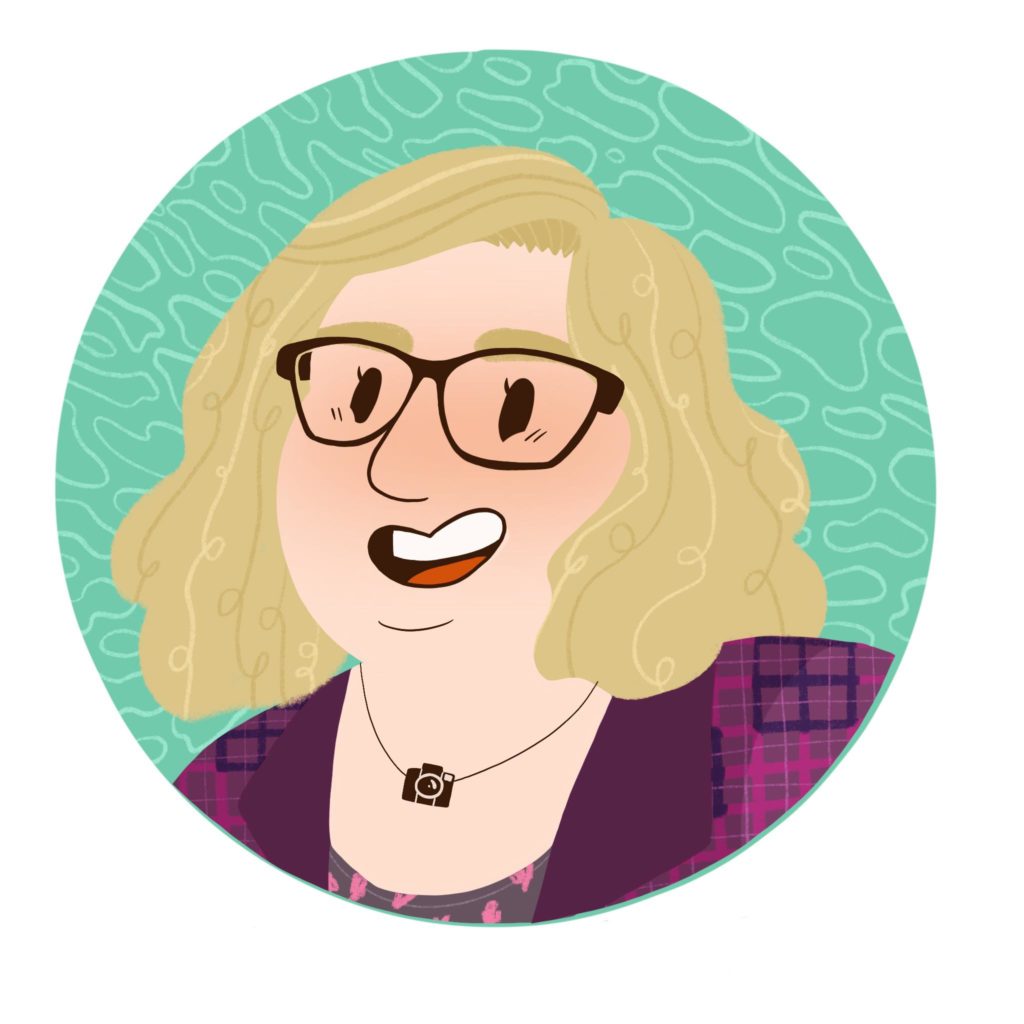
Every Monday, I send out my Body Liberation Guide, a thoughtful email jam-packed with resources on body liberation, weight stigma, body image and more. And it’s free. Let’s change the world together. Subscribe »
Hi there! I'm Lindley. I create artwork that celebrates the unique beauty of bodies that fall outside conventional "beauty" standards at Body Liberation Photography. I'm also the creator of Body Liberation Stock and the Body Love Shop, a curated central resource for body-friendly artwork and products. Find all my work here at bodyliberationphotos.com.


